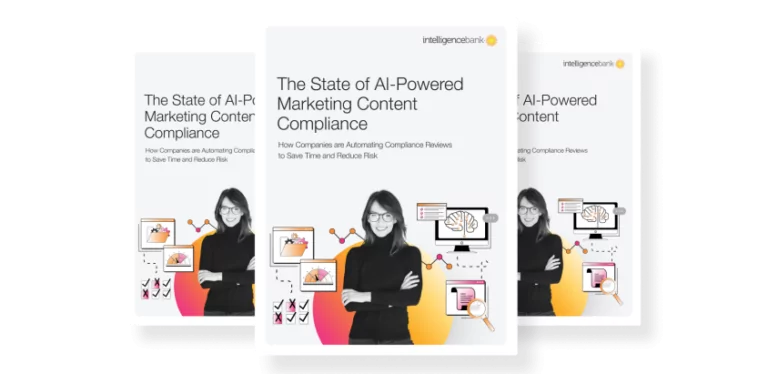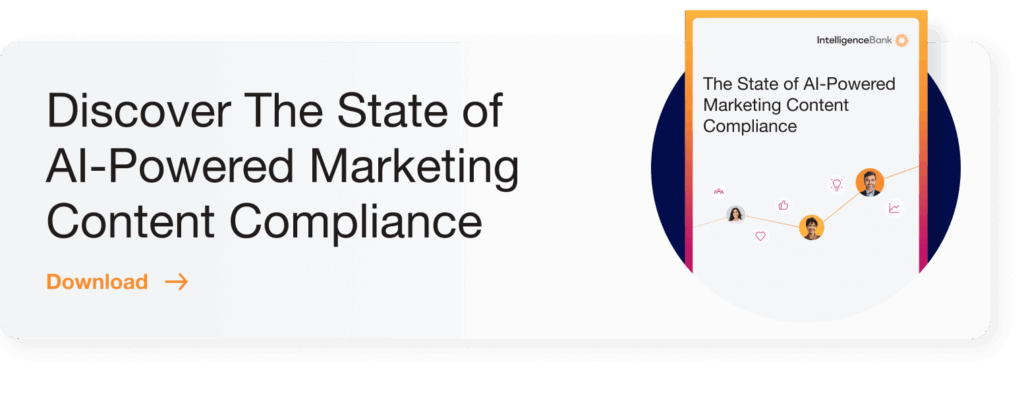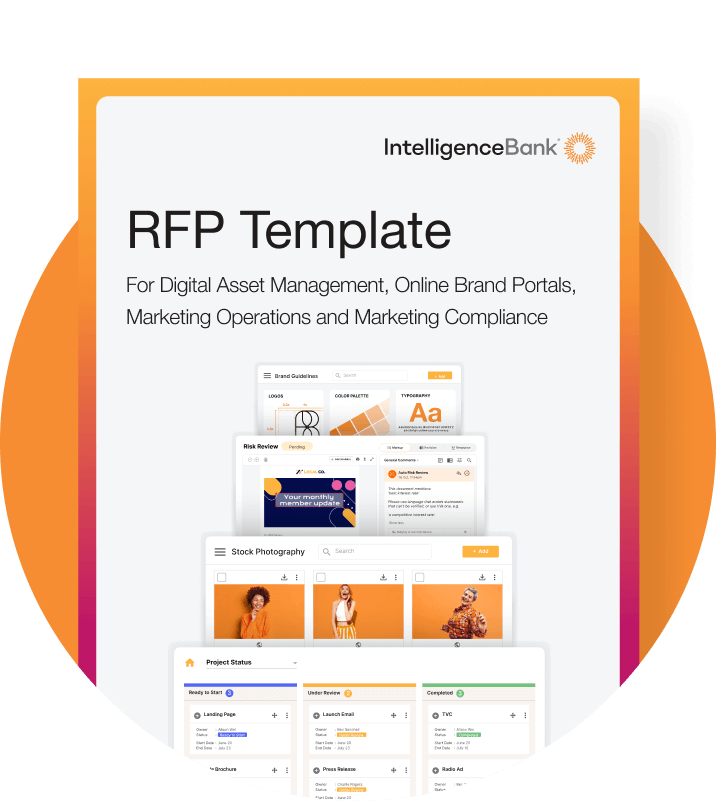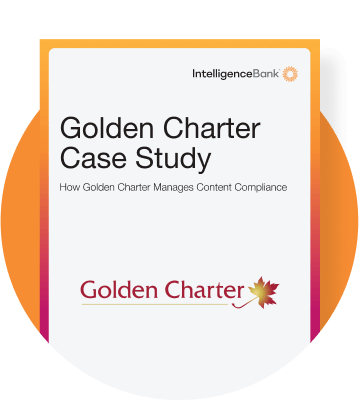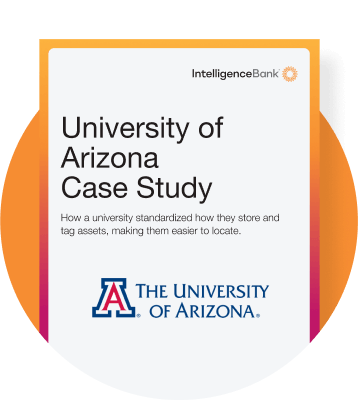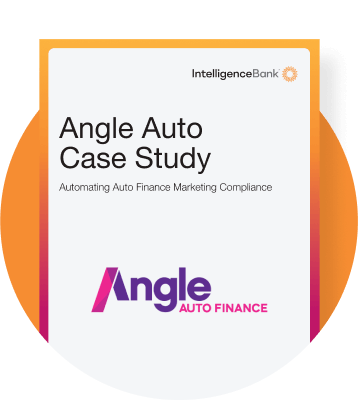What is AI-powered marketing compliance? It’s the process of using AI and machine learning to automate previously manual marketing content reviews.
Content creation has never been more dynamic, with digital ad spend soaring and AI tools empowering teams to produce more content at unprecedented speed. But as the volume of content increases, so do the challenges for legal and compliance teams tasked with ensuring every piece adheres to strict regulatory standards.
It’s for this reason marketers and legal teams are increasingly adopting AI-powered marketing compliance solutions to adapt to this growing challenge. We conducted in-depth interviews with leading organizations to explore how AI is radically changing the way they maintain marketing compliance. We’ve compiled the results into a report on ‘The State of AI-powered Marketing Content Compliance’. The report covers challenges faced, solutions deployed and results they’ve seen.
What’s Driving the Need for AI in Compliance?
Manual content reviews are rapidly becoming obsolete as they struggle to keep up with the sheer volume of content. Friction between marketing teams, who are under pressure to meet tight deadlines, and legal teams, who prioritize thoroughness over speed, is common across industries. Pain points for marketers include delays and at times conflicting advice, where legal and compliance teams suffer frustration from correcting repetitive errors. Compounding this is the fact that regulatory requirements are constantly evolving, making compliance even more complex and time-consuming.
Along with pace, volume and moving compliance goal posts, there are other factors driving the emergence of AI-powered marketing content compliance tools. They include:
The Spectre of Financial Penalties
Top on the list for all organizations is the horrific fines and penalties dished out for marketing compliance breaches by governing bodies such as The Federal Trade Commission (FTC) in the US, the Advertising Standards Authority (ASA) in the UK and the Australian Competition and Consumer Commission (ACCC). Nobody wants to see their marketing budget go up in smoke with canceled campaigns and crippling fines.
Regulatory Priorities
Each year, regulatory bodies choose to highlight specific areas for concern where they believe there is a trend toward marketing compliance breaches. For example, it could be greenwashing, misleading pricing claims in telecommunications or products marketing at teens. For example, last year, the FTC issued guidance on “blurred advertising,” where advertising content is blended with non-advertising content, potentially confusing kids and teens about its nature and purpose. It also issued warning notices to nearly 700 advertisers in the health sector warning them of the consequences of false or misleading activity.
Regulators Using AI to Monitor Content
Regulatory bodies are ahead of the curve when it comes to monitoring for compliance breaches, with many across the globe deploying their own tech. That means being caught for a breach – no matter how unintentional – is now a matter of ‘when’ not ‘if’. Obscure webpages and digital ads are no barrier to regulators’ ability to scrutinize content at scale as they are using advanced AI-powered marketing compliance tools as their first pass at identifying errors.
New and Diverse Media Channels
In the UK and Europe, brands must remember that they are responsible for all social media activities, including those by third parties. In Australia, consumer watchdog, the ACCC, reports that over 80% of social media influencers are making misleading claims. Marketers need to be aware of the tightened rules on transparency between brand partners and online influencers.
Evolving Products and Services
The introduction of new categories such as crypto currency and the sharing economy has led to significant amendments to legislation. Regulations are continually updated, and not all organizations are keeping up with these changes. This is resulting in an increase in unintentional non-compliance.
Increased Competition
It’s tough out there. Organizations with a high appetite for risk may attempt to push particular messages in order to stand out amongst the competition. This can lead to exaggerated or misleading claims in the effort to attract customers.
Our report delves into these issues, showcasing how AI is not just a nice-to-have but a necessity for scaling compliance efforts without ballooning headcount.

What’s the Cost of Non-Compliance?
The instances of companies being fined by regulators are well documented. They are numerous and at times financially crippling. But staying within marketing regulatory code is not just about avoiding fines—there is yet ‘another’ cost.
Non-compliance can lead to severe reputational damage, loss of customer trust, and missed business opportunities. There are many examples of firms who faced significant backlash and lost clients due to non-compliant marketing materials that slipped through the cracks. The integration of AI into compliance processes isn’t just about efficiency; it’s about safeguarding the brand and ensuring long-term success.
What are the Key Marketing Compliance Issues?
Our report highlights these in more detail, but here’s a peek at some of the AI marketing compliance intel you’ll find how:
- Organizations are Scaling Compliance Efforts
Learn how AI is helping organizations handle the increased demand for content reviews without the need to expand their compliance teams. For instance, one organization reported that AI-enabled content scanning saved them approximately 400 years’ worth of manual review time. - AI Marketing Compliance is Helping Reduce Errors
Discover how taking a proactive approach and using AI marketing compliance tools are catching mistakes that manual processes often miss. - AI is Working for Brand Compliance
Ensuring that content is not only regulatory compliant but also aligned with brand guidelines is important. This is particularly crucial in industries where even a single slip in judgment could result in damage to brand reputation. - To Easily Adapt to Regulatory Changes
With compliance rules varying across jurisdictions and constantly evolving, AI-powered marketing compliance tools offer a flexible solution that can be tailored to meet the specific needs of different industries. This adaptability is key to maintaining compliance without slowing down the content creation process. - Teams are Integrating AI into their Content Production Workflow for Efficiency
The report highlights the importance of seamless integration between AI compliance tools and content management systems. This integration not only streamlines workflows but also enhances the overall efficiency of compliance operations.
Why is it Important to Keep Up With AI Marketing Compliance Tools and Trends?
Aside from risk mitigation and being abreast of the constantly evolving marketing compliance, there are a number of compelling reasons to stay on top of innovations best practices.
- Competitive Advantage
Organizations that leverage the latest AI marketing compliance tools can gain a significant competitive edge. These tools help streamline compliance processes, reduce manual errors, and allow marketing teams to focus on creativity and strategy rather than getting bogged down by compliance checks. Being at the forefront of AI trends ensures that teams are not just compliant but also more efficient and innovative in their marketing efforts. - Enhanced Collaboration
New AI-powered marketing compliance tools often come with features that improve collaboration between marketing, legal, and compliance teams. By staying updated, teams can implement solutions that facilitate smoother workflows, better communication, and quicker decision-making. This leads to a more cohesive approach to compliance and reduces friction between departments. - Future-Proofing
The marketing and compliance landscape is likely to become even more complex in the future. Teams that are knowledgeable about the latest AI marketing compliance tools and trends will be better prepared to navigate this complexity. By adopting forward-looking technologies, they can ensure their strategies are resilient and adaptable to future challenges. - Cost Efficiency
AI tools often bring more cost-effective solutions by automating repetitive tasks, reducing the need for large compliance teams, and minimizing the risk of errors that could lead to expensive penalties. Being aware of these tools allows organizations to optimize their resources and achieve better results with lower costs.
Ways to Keep Up with Marketing Compliance Tech
When it comes to compliance, we advise teams to adopt a proactive approach that includes continuous learning, strategic planning, and leveraging the right tools. Here’s how:
Invest in Continuous Learning and Training
Make ongoing education a priority. Reading reports citing real-life, practical solutions and results is one of the best ways to do this. You can also encourage team members to attend industry conferences, webinars, and workshops focused on AI, marketing compliance, and regulatory updates. Regularly schedule internal training sessions to ensure that everyone is up-to-date with the latest tools and best practices. Subscribing to relevant newsletters and following industry thought leaders can also provide valuable insights.
Leverage Industry Networks and Communities
Join professional networks and communities where marketing, legal, and compliance professionals share insights, experiences, and emerging trends. Engaging with these communities can help you gain early access to new tools, case studies, and practical advice. Participating in discussions and forums allows your team to exchange ideas and learn from the successes and challenges faced by others in the industry.
Collaborate with AI and Compliance Experts
Building relationships with AI and compliance experts can provide your team with specialized knowledge and guidance. Collaborating with vendors who specialize in AI-powered compliance solutions will keep you at the forefront of the latest product developments and innovations.
Foster a Culture of Innovation
Encourage a culture that values innovation and experimentation. Create an environment where team members feel empowered to suggest and implement new ideas, including adopting the latest AI tools and strategies. Regularly revisit and revise your compliance processes to ensure they remain effective and innovative, keeping your organization ahead of the curve.
Benchmark Against Industry Leaders
Compare your AI marketing compliance efforts with those of industry leaders. Benchmarking against top-performing companies can help you identify gaps in your strategy and uncover opportunities for improvement. Studying their approaches can provide inspiration and practical insights that you can adapt to your own organization.
Develop a Strategic Roadmap
Create a strategic roadmap that outlines your goals for staying ahead in AI marketing compliance. This roadmap should include plans for adopting new technologies, training initiatives, and collaboration efforts. Regularly update this roadmap to reflect changes in the industry and ensure your team remains on track to achieve its objectives.
Want to Know More?
The full report offers a deeper understanding of how AI is transforming marketing compliance, featuring real-world examples from leading organizations. Whether you’re a marketing leader looking to streamline your compliance processes or a compliance professional aiming to reduce risk, this report provides actionable insights that can help you navigate the complexities of cutting-edge marketing compliance.
Stay ahead of the curve. Download the full report or better yet, contact us for more information.
